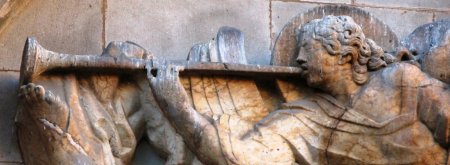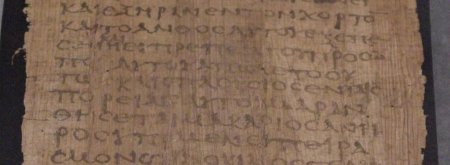Bible Scandals
I once gave my wife an anniversary present a day late. I remember feeling slightly apprehensive about what she would say, but to my relief she admitted that she’d forgotten too. Perhaps she was just being extra-forgiving. But the correct date for a celebration is important, and Jews in New Testament times couldn’t simply decide, for the sake of convenience, to celebrate a festival on another day. That would, perhaps, be even more disrespectful than our celebrating the resurrection on Good Friday! And yet it appears that Jesus did exactly that when he ate his last supper with the disciples as a Passover meal.
The Synoptic Gospels (Matthew, Mark and Luke) clearly say that Jesus celebrated Passover that evening (Matthew 26:17-19; Mark 14:12-16; Luke 22:7-15), but John says that the priests, and presumably everyone else, ate the Passover meal on the next evening (John 18:28). This suggests that Jesus ate Passover a day early.
Several other potential scandals marred this final Passover. First, Jesus refused to drink the last cup of wine, only drinking three of the four cups that were essential to the ceremony. Second, he persuaded his disciples to eat some extra bread after the meal had finished, which detracted from the importance of the lamb. And third, Jesus identified himself with the bread and wine in a way that was close to idolatry.
These changes have much more importance than the fact that they are deviations from the normal Passover customs. When Jesus did these things differently, he knew it would stand out in the disciples’ memories and that they’d want to know what it meant. Imagine that Jesus was celebrating Christmas but neglected to give any gifts and refused to accept any. We would conclude that he was opposed to Christmas presents, and we might think that he was making a statement against materialism. In the same way, everything that Jesus did contrary to a normal Passover became a message. But in order to find out what this message was, we need to know what would normally happen at a Passover meal.
Although it’s surprising to us that Jesus celebrated Passover a day early, it wouldn’t actually have been too much of a shock for Jews of the time. We know that some Jews did celebrate Passover a day early in Jesus’ day, though even a few decades later no one could remember the reason why.
Two rabbis, Joshua and Ben Bathyra, discussed this question in about AD 90. Ben Bathyra thought it was due to variations in the beginning of a new month. Jews started their months whenever they saw the first slither of new moon, but sometimes it might be seen in Galilee one night, while fog in Jerusalem prevented it from being seen until the following night. In that case the Galileans would be one day ahead. Rabbi Joshua, however, thought the discrepancy was due to a stretched interpretation of the phrase “between the evenings” (a literal translation of Exodus 12:6). This was normally understood to mean “between the start and end of evening”, but some people interpreted it to mean “between one evening and the next”. In this case they could therefore eat the Passover meal at any time from the start of the previous evening.
The two rabbis couldn’t decide who was right, and modern debates have similarly failed to come to a conclusion. But the fact that the discussion took place shows us that some Jews did eat the Passover a day early, like Jesus did.[1]
If having the Passover meal a day early wasn’t actually a real deviation from normal practice, what about the other differences? The Passover rules said that every celebrant should take part in four cups of wine, and that a poor person should even mortgage his warm cloak in order to afford these four cups.[2] And there was also an ancient rule that no food (such as bread) should be eaten after the main meal.[3] However, both these rules were introduced after Jesus’ day and, in his time, only three cups were compulsory – the fourth was optional. Therefore neither Jesus’ introduction of some extra bread at the end of the meal, nor his refusal to drink the fourth cup, was particularly significant either.
The compulsory fourth cup was introduced later to curtail those Jews who wanted to end the Passover meal with a drinking party like the Romans did at their banquets. To accompany this fourth cup, the serving of more bread was added to the ritual. In modern Passover meals this bread is hidden so that the children can go around the room and search for it. The Roman drinking party was known as an epikômos and this word gradually changed to aphikomen – the modern name for this last part of the Passover meal.
Even when Jesus said “this bread is my body”, he wouldn’t have caused much comment or consternation among the disciples. It sounds rather mystical to our ears, but the imagery fitted in with the rest of the ritual that went with the meal. The leader said something like: “These bitter herbs are the bitterness our ancestors suffered in Egypt; this brown charoset paste is the mortar they used for bricks; and this bowl of salt water is the tears which they wept.” When Jesus followed this up with “this bread is my body”, the disciples would have wondered what he meant, but it wouldn’t have sounded utterly incongruous.
However, there were two aspects of Jesus’ last Passover which were totally unprecedented and, for any first-century Jew, disgusting and scandalous. The first incident was Jesus’ insistence on washing his disciples’ feet, and this was followed by his designation of the third cup as “my blood”. These two events happened right at the start and finish of the meal, and must have utterly scandalized those in the room.
First, a servant came to Jesus with a bowl of water and a towel so that he could ceremonially wash his hands before saying grace. Instead, Jesus tied the towel round his waist, picked up the bowl, and made his way round the table, acting as a servant to all the others. We can measure the shock-value of this action by Peter’s reaction. He utterly refused to let Jesus wash his feet until Jesus insisted in very strong terms (John 13:8).
After this embarrassment, the meal started as normal with the first cup of wine accompanied by bitter herbs wrapped in bread and dipped in the charoset paste. Jesus gave this to Judas, as if to an honoured guest. The second cup of wine was followed by the main meal of lamb, and then the third cup should have ended the meal.
Jesus’ introduction of bread before the third cup, saying, “This is my body” was certainly unusual and memorable. But the disciples wouldn’t have been truly surprised or scandalized until he took the third cup and blessed it, saying: “This is my blood.” Mark implies that they all drank it before Jesus spoke these startling words (Mark 14:23-24). This sounds realistic, because it is almost unbelievable that any pious Jew would drink the wine after it had been called “blood”.
Drinking blood was the strongest taboo in the Old Testament. It was regarded as almost akin to murder because “the life of a creature is in its blood” (Leviticus 17:3-6, 10-14). Anyone who killed an animal for food without ritually draining all of its blood had to be expelled from Israel. Priests even avoided drinking the red wine that accompanied offerings, even though they could consume the cereals and oil that were given with the same offerings. Perhaps they were worried that someone might think they were drinking the blood so, to prevent this, they ceremonially poured away the wine in view of everyone. This practice is only implied in the Old Testament, but it is stated clearly in later Jewish writing: “He poured out the libation of the blood of the grape at the foot of the altar."[4] It is certain that no Jew would drink wine that was even symbolically “blood”.
The message Jesus was giving at the meal is very important because it is what he intended us to remember at Communion or Mass. In behaving like a servant and calling the wine his blood, Jesus was clearly saying that he was a servant and a sacrifice.
These two roles are related to each other. When Jesus was explaining how he was going to save humanity, he said: “The Son of Man did not come to be served, but to serve, and to give his life as a ransom for many” (Mark 10:45; Matthew 20:28). At his last Passover, a servant brought water to Jesus, but instead of accepting the service of another, Jesus went and served everyone else. And his declaration that the wine was “my blood … which is poured out for many” (Matthew 26:28) is similar to the phrase “give his life as a ransom for many”. The correspondence is close and is unlikely to be a coincidence.
It would have been so easy at this last Passover for Jesus to provoke his disciples to love him, pity him, regard him as a hero, or even as their God. But he aimed for none of these. Instead, Jesus wanted them to remember him doing the job of a servant and giving his whole life for them. The taking of Communion, which we see as a ceremony to remind us of Jesus’ greatness and our salvation, had a rather different purpose in his own mind. Jesus was reminding us primarily that he lived as a servant and that he calls his followers to be servants of each other.
For Jesus’ followers today, the scandal of the last Passover meal isn’t about the changes that he made to it – though they were certainly scandalous at the time. The scandal now is the way in which many parts of the church have subverted Jesus’ emphatic message about servanthood by changing it into a ceremony which elevates church leaders above the congregation.
Go to 3. Prostitutes
References
[1] The priests knew this would happen and allowed the people to bring their Passover lambs a day early; they pretended it was a Peace Offering and it was processed in exactly the same way as a Passover offering. See Tosephta Pesachim 4.8; Mishnah Zebachim 1.3.
[2] Mishnah Pesachim 10.1.
[3] Mishnah Pesachim 10.8.
[4] Ben Sira 50.15; Numbers 15:10.
To see the full list of contents and find out more about The Jesus Scandals, visit the book's website: www.BibleScandals.com.
Buy the book from Amazon.co.uk.
© 2012 David Instone-Brewer
This article is reproduced by the kind permission of the author and may not be further reproduced without written permission.



